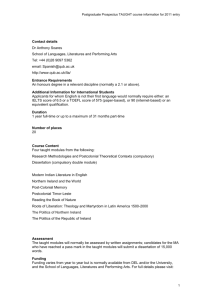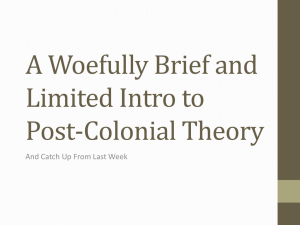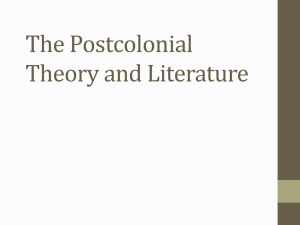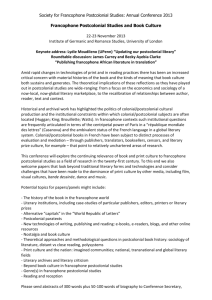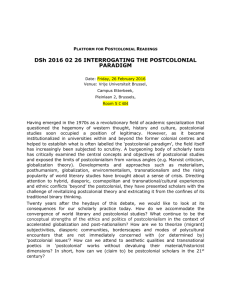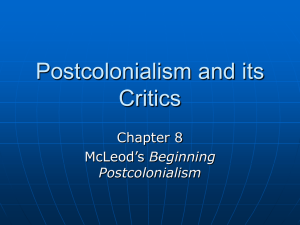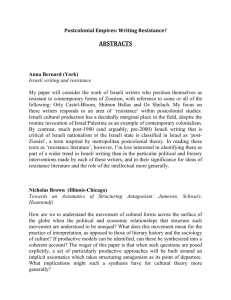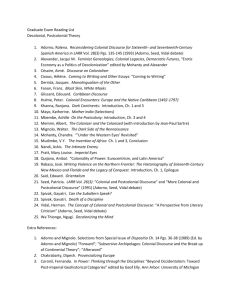1 Hacettepe University Faculty of Letters Department of English
advertisement
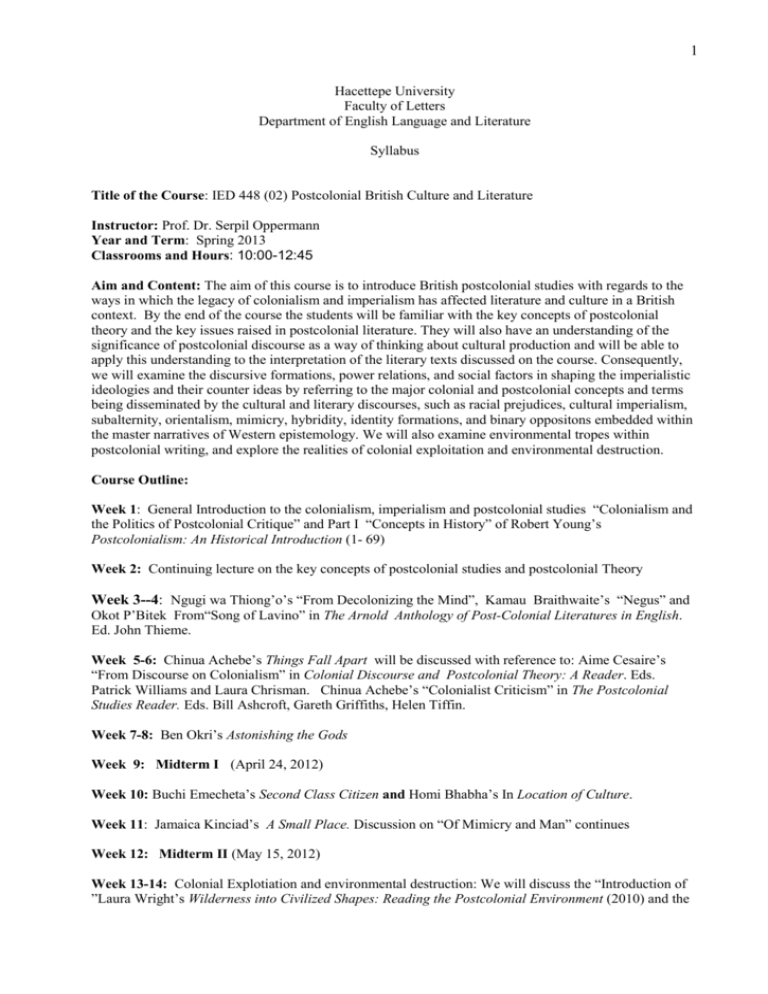
1 Hacettepe University Faculty of Letters Department of English Language and Literature Syllabus Title of the Course: IED 448 (02) Postcolonial British Culture and Literature Instructor: Prof. Dr. Serpil Oppermann Year and Term: Spring 2013 Classrooms and Hours: 10:00-12:45 Aim and Content: The aim of this course is to introduce British postcolonial studies with regards to the ways in which the legacy of colonialism and imperialism has affected literature and culture in a British context. By the end of the course the students will be familiar with the key concepts of postcolonial theory and the key issues raised in postcolonial literature. They will also have an understanding of the significance of postcolonial discourse as a way of thinking about cultural production and will be able to apply this understanding to the interpretation of the literary texts discussed on the course. Consequently, we will examine the discursive formations, power relations, and social factors in shaping the imperialistic ideologies and their counter ideas by referring to the major colonial and postcolonial concepts and terms being disseminated by the cultural and literary discourses, such as racial prejudices, cultural imperialism, subalternity, orientalism, mimicry, hybridity, identity formations, and binary oppositons embedded within the master narratives of Western epistemology. We will also examine environmental tropes within postcolonial writing, and explore the realities of colonial exploitation and environmental destruction. Course Outline: Week 1: General Introduction to the colonialism, imperialism and postcolonial studies “Colonialism and the Politics of Postcolonial Critique” and Part I “Concepts in History” of Robert Young’s Postcolonialism: An Historical Introduction (1- 69) Week 2: Continuing lecture on the key concepts of postcolonial studies and postcolonial Theory Week 3--4: Ngugi wa Thiong’o’s “From Decolonizing the Mind”, Kamau Braithwaite’s “Negus” and Okot P’Bitek From“Song of Lavino” in The Arnold Anthology of Post-Colonial Literatures in English. Ed. John Thieme. Week 5-6: Chinua Achebe’s Things Fall Apart will be discussed with reference to: Aime Cesaire’s “From Discourse on Colonialism” in Colonial Discourse and Postcolonial Theory: A Reader. Eds. Patrick Williams and Laura Chrisman. Chinua Achebe’s “Colonialist Criticism” in The Postcolonial Studies Reader. Eds. Bill Ashcroft, Gareth Griffiths, Helen Tiffin. Week 7-8: Ben Okri’s Astonishing the Gods Week 9: Midterm I (April 24, 2012) Week 10: Buchi Emecheta’s Second Class Citizen and Homi Bhabha’s In Location of Culture. Week 11: Jamaica Kinciad’s A Small Place. Discussion on “Of Mimicry and Man” continues Week 12: Midterm II (May 15, 2012) Week 13-14: Colonial Explotiation and environmental destruction: We will discuss the “Introduction of ”Laura Wright’s Wilderness into Civilized Shapes: Reading the Postcolonial Environment (2010) and the 2 “Introduction” of Graham Huggan and Helen Tiffin’s Postcolonial Ecocriticism: Literature, Animals, Environment (2010). Method of Instruction: Interactive: comprised of discussions, student presentations and lectures. Course Requirements: Attendance is obligatory. More than 12 hours of absence will result in F1. Students must be fully prepared and come on time to class, having read the assigned material. Assessment: In the grading of oral and written work 25% will be taken off for language mistakes. There will be two midterm exams (50% each, in this will be included 10 % of presentations), and a Final Exam (50 %). The passing grade in the Final is 50. Reading List: A. Literary Texts: Chinua Achebe. Things Fall Apart Ben Okri- Astonishing the Gods Buchi Emecheta. Second –Class Citizen Jamaica Kinciad. A Small Place The following short texts are from The Arnold Anthology of Post-Colonial Literatures in English. Ed. John Thieme. London: Arnold,1996 a. Okot P’Bitek From“Song of Lavino” b. Ngugi wa Thiong’o’s “From Decolonizing the Mind”, c. Kamau Braithwaite’s “Negus” B. Critical texts: 1. John McLeod. Beginning Postcolonialism. 2000 2. Aime Cesaire. “From Discourse on Colonialism,” Franz Fanon. “On National Culture,” Edward Said. “From Orientalism” in Colonial Discourse and Postcolonial Theory: A Reader. Eds. Patrick Williams and Laura Chrisman. 1993 Ngugi wa Thiong’o’s “From Decolonizing the Mind”, Denis Williams’s 3. “From Other Leopards,” Kamau Braithwaite’s “Negus” in The Arnold Anthology of PostColonial Literatures in English. Ed. John Thieme. 1996 4. Robert J.Cç Young. Postcolonialism: An Historical Introduction. 2001 5. Chinua Achebe’s “Colonialist Criticism” in The Postcolonial Studies Reader Eds. Bill Ashcroft, Gareth Griffiths, Helen Tiffin 6. Elleke Boehmer. Colonial and Postcolonial Literature. 1995 7. Ania Loomba. Colonialism/Poscolonialism. 1998. 8. Jürgen Osterhammel. Colonialism. 1997. 9. Edward Said. Culture and Imperialism. 1993. 10. Homi Bhabha. “Of Mimicry and Men.” The Location of Culture. 1995. 11. Stephen Slemon. “Postcolonial Critical Theories.” Postcolonial Discourses: An Anthology. Ed. Gregory Castle. 2001 12. Bill Ashcroft, Gareth Griffiths and Helen Tiffin. Eds. Key Concepts in Post-Colonial Studies. 1998. 13. Michel Foucault. Power and Knowledge 14. Laura Wright. Wilderness into Civilized Shapes: Reading the Postcolonial Environment 2010. 15. Graham Huggan and Helen Tiffin. Postcolonial Ecocriticism: Literature, Animals, Environment (2010). Useful Links: 1. http://faculty.pittstate.edu/~knichols/colonial2.html#terms 2. http://www.literaryhistory.com/20thC/Groups/postcolonial.htm 3 3. http://www.qub.ac.uk/schools/SchoolofEnglish/imperial/imperial.htm 4. http://www.wsu.edu:8080/~brians/anglophone/postcolonial.html

